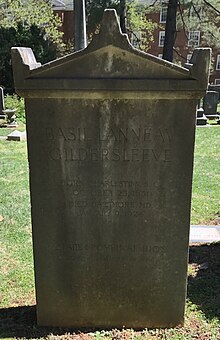He was born in
Charleston, South Carolina to Emma Louisa Lanneau (daughter of Bazille Lanneau and Hannah Vinyard) and
Benjamin Gildersleeve (1791–1875). His father was a
Presbyterian evangelist, and editor of the Charleston
Christian Observer from 1826 to 1845, of the
Richmond, Virginia Watchman and Observer from 1845 to 1856, and of
The Central Presbyterian from 1856 to 1860. His maternal grandfather was Bazile Lanneau (born Basile Lanoue), one of the many
French Acadians who were
forcibly expelled by the British from present day
Nova Scotia during the
French and Indian War. His maternal grandmother was Hannah Vinyard. He graduated from
Princeton in 1849 at the age of eighteen, and went on to study under
Johannes Franz in
Berlin, under
Friedrich Ritschl at
Bonn and under
Friedrich Wilhelm Schneidewin at
Göttingen, where he received his
PhD in 1853. Upon returning to the United States, he was offered a position as a Classics professor at Princeton, but he turned it down.
[2] From 1856 to 1876 he was professor of
Greek at the
University of Virginia, holding the chair of
Latin also from 1861 to 1866.
[3] He married September 18, 1866 in
Middlebury, Virginia to Eliza Fisher Colston.
After service for the
Confederate States Army in the
American Civil War, during which Gildersleeve was shot in the leg, he returned to the University of Virginia.
[4] Ten years later, he accepted an offer from
Daniel Coit Gilman to teach at
Johns Hopkins University in
Baltimore.
[5] When the Johns Hopkins University opened in 1876, Gildersleeve was one of five original full professors and was responsible for setting up a program in the study of Greek and Roman literature, at which he succeeded admirably. He chose junior faculty and graduate students who went on to make a major impact in classical studies, at Johns Hopkins and elsewhere. His hiring also helped to reassure the
Baltimore community that the new university was not just a northern institution transplanted south.
Johns Hopkins was known to be
opposed to slavery, founding president
Daniel Coit Gilman was from
Connecticut, and most other faculty were from the northern states, which led to suspicion regarding the intent of the new institution.
[6]
In 1880, the
American Journal of Philology, a quarterly published by the Johns Hopkins University, was established under his editorial charge, and his strong personality was expressed in the department of the
Journal headed "Brief Report" or "Lanx Satura," and in the earliest years of its publication every tiny detail was in his hands. His style in it, as elsewhere, is in striking contrast to that of the typical classical scholar, and accords with his conviction that the true aim of scholarship is "that which is." He published a
Latin Grammar (1867; revised with the co-operation of
Gonzalez B. Lodge, 1895 and 1899; reprinted 1997 with a bibliography of twentieth-century work on the subject)
[7] and a
Latin Series for use in secondary schools (1875), both marked by lucidity of order and mastery of grammatical theory and methods. His edition of
Persius (1875) has been attributed great value.
[3]
Gildersleeve bent was rather toward Greek than Latin. His special interest in
Christian Greek was partly the cause of his editing the
Apologies of
Justin Martyr (1877), which claimed to have "used unblushingly as a repository for [his]
syntactical formulae." Gildersleeve's studies under Franz had no doubt quickened his interest in Greek
syntax, and his
logic, untrammeled by previous categories, and his marvelous sympathy with the language were displayed in this most unlikely of places. His
Syntax of Classic Greek (Part I, 1900, with
CWE Miller) collects these formulae. Gildersleeve edited in 1885
The Olympian and Pythian Odes of Pindar, with what was called "a brilliant and valuable introduction." His views on the function of grammar were summarized in a paper on
The Spiritual Rights of Minute Research delivered at
Bryn Mawr on June 16, 1895. His collected contributions to literary periodicals appeared in 1890 under the title
Essays and Studies Educational and Literary.
[3]
The Atlantic Monthly published an article by Gildersleeve titled "The Creed of the Old South" in January 1892, and an essay—"A Southerner in the Peloponnesian War"— in September 1897.
Johns Hopkins Press later published them in a book in 1915.
[8]

Gildersleeve's gravestone at the
University of Virginia Cemetery in
Charlottesville, Virginia.
He was elected
president of the American Philological Association in 1877 and again in 1908 and became a member of the
American Academy of Arts and Letters as well as of various learned societies. He received the
honorary degree of
LL.D. from
William and Mary (1869),
Harvard (1896),
Yale (1901),
Chicago (1901),
[9] and
Pennsylvania (1911);
D.C.L. from the
University of the South (1884);
L.H.D. from Yale (1891) and Princeton (1899); and
Litt.D. from
Oxford and
Cambridge (1905).
Gildersleeve retired from teaching in 1915. He died on January 9, 1924 and was buried at the
University of Virginia cemetery. In a memorial published in the
American Journal of Philology, Professor
C. W. E. Miller paid tribute to Gildersleeve by stating, “Of Greek authors, there were few with whom he did not have more than a bowing acquaintance.”
[10]
In more recent years, Gildersleeve has received critical attention for his unapologetic
defense of slavery, during and after the Civil War. In
Soldier and Scholar: Basil Lanneau Gildersleeve and the American Civil War,
Ward Briggs published editorials written by Gildersleeve while he served as a staff officer in the Confederate Army and as a professor at the University of Virginia. These editorials feature vitriolic attacks on critics of slavery, with parallels drawn to ancient Greek authors and situations. He expressed his contempt for Confederate President
Jefferson Davis, whom he considered inept. Jews also came under attack in his writings (including Confederate cabinet officer
Judah P. Benjamin), as did those accused of
miscegenation.
[11]




